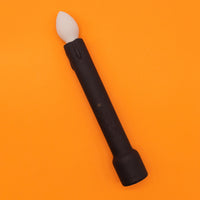When the word “everybody” is used in a sentence, it often does a lot of heavy lifting. When sex therapists say “everybody masturbates,” we feel the need to question that, too. Fact check: Not quite everybody. The National Survey of Sexual Health and Behavior, led by noted sexual medicine researcher Debby Herbenick, found that 95 percent of penis-havers and 89% of vulva-havers say they’ve masturbated at some point during their lives.
And it’s not just adults for whom masturbation is a normal part of life; it’s likely to begin when the body increases production of sex hormones in puberty. The voluminous Janus Report on Sexual Behavior, a nationwide survey conducted in 1993, found that 53% of “males” and 25% of “females” had begun pleasuring themselves by the age of 13. It might be safe to say those numbers are even higher today. Bottom line: adding all of those numbers lets us conclude that almost everybody masturbates.
That’s why we’re going to skip the clinical definition and detailed explanation of masturbation. We probably don’t have to debunk the “it’ll make you go blind!” nonsense, either. Instead, let’s focus on the reasons that masturbating feels so incredibly good – and on its potential health benefits.
Why Do People Masturbate?
You might guess the most common answer to that question would be “in order to have an orgasm.” Another good guess would be “because I didn’t have a partner around at the moment.” One survey actually asked the question in 2016. And more than half of all respondents said the primary reason they pleasure themselves is to relieve stress.
There are many other reasons why people masturbate. For example, masturbating can help them relax and get to sleep; that’s obviously somewhat related to stress relief. It helps them learn more about their own body’s responses to sexual stimulation, and having that information can help improve partnered relationships as well as solo sex sessions.
And speaking of partnered relationships, mutual masturbation is on the sexual activity menu of many couples (or throuples). It lets each partner see what the other one enjoys, it’s safe sex with no risk of STIs or STDs (sexually transmitted infections and diseases), it can be a good way to introduce vibrators or dildos into a relationship (or increase the pleasure that sex toys can produce), it can add intimacy or an element of sexy voyeurism into a couple’s sex life – and of course, it’s fun.
Most of those reasons can be boiled down to one simple explanation of the joys of masturbating: it feels good. Let’s add one more ingredient to the recipe, though. It can improve the masturbator’s health.
Health Benefits of Masturbation
There hasn’t been much rigorous research on all of the benefits you can receive from masturbating. Many have been proven, though.- Frequent masturbation can help protect penis-havers against prostate cancer. Studies have shown that those who ejaculate more often, whether the ejaculation is a result of self-pleasure or penetrative sex, are less likely to contract the disease. There’s also some evidence that masturbating can help vulva-havers reduce the risk of infections of the cervix and urinary tract, potentially reducing the risk of cervical cancer.
- Orgasms can help with pain relief. Existing research primarily focuses only on “female masturbation,” but it shows self-stimulation (particularly vaginal stimulation, rather than clitoris play) can increase pain tolerance by about 40%. The pain relief delivered by masturbation is also evident during menstrual periods, of course. The body’s release of endorphins and hormones during climax is believed to be responsible – and since penis-havers’ bodies release most of the same hormones, it makes sense that their masturbatory orgasms help them feel better, too.
- A related benefit, which the survey respondents we’ve mentioned understood without reading academic journals: masturbating helps relieve stress. The “love hormone” oxytocin is released during orgasm, and increased oxytocin levels cause a reduction in the “stress hormone” cortisol. One more benefit: oxytocin, plus the endorphins and other hormones we’ve mentioned, boost mood and improve happiness levels.
- Sexual arousal and orgasm associated with masturbation appear to temporarily boost the immune system.
- Sexual activity, including masturbation, can help strengthen pelvic floor muscles. Those muscles help with blood flow, bowel and urinary function, and sexual response. (Sadly, though, masturbating doesn’t burn many calories.)
- Many people find that masturbating increases their sex drive. In fact, masturbation is often suggested as one element of treatment for vulva-havers who are suffering with sexual dysfunctions like arousal difficulty or low libido.
- Some find that masturbation helps their performance with sexual partners. Penis-havers who self-satisfy before partnered sex often “last longer” the second time, and masturbating can give people of all sexes and genders more confidence in bed.
- Finally, masturbation helps people release the sexual tension that can build up during the day, and – needless to say – it can provide enormous amount of sexual pleasure.
Can Masturbating Hurt You?
Masturbation is essentially harmless. Yes, if you get too eager or careless, it can cause chafed skin or even some miniscule cuts or abrasions. And a penis-haver can suffer a bit of swelling, and decreased sensitivity in the nerve endings of their penis, after going at it a little too enthusiastically. All of that will heal quickly and naturally – and hopefully will be a reminder to use a different technique or more lube the next time.
A bigger problem for some masturbators is guilt (or shame). That’s most likely to be an issue if their culture or religion frowns on sexual relations outside of marriage or for reasons other than procreation. Even the knowledge that masturbation is healthy and normal may not completely override the beliefs they have been taught. Discussing the situation with a health professional or even better, a therapist, can help the person sort out and resolve those difficult feelings. There’s one more reason that people may feel guilty about masturbating: their existing relationship(s).
Some feel that when they pleasure themselves, they’re actually “cheating” on their partner(s). That’s often a byproduct of the mistaken belief that masturbation and partnered sex are an either/or situation. They’re not. In fact, there’s research showing that people who aren’t in a relationship self-pleasure an average of 16 times each month. And for those in a relationship the average is 11 times per month – no matter how satisfied they are with their partner. As someone once wrote (oh, it was us!), almost everybody masturbates.
Conversely, some get angry if they learn that their partner has been masturbating, mistakenly believing it means that their partner is cheating on them. Despite the truth about masturbation in partnered relationships, that anger can be toxic. In other words, an unexpected consequence of masturbating, without telling (or including) a partner, could be long-lasting damage to the relationship. In either case, the best approach is honest communication about sexual needs, desires and practices, perhaps followed by sexual or relationship counseling.
Finally, there’s the issue of masturbating “too much.” We’re not referring to people who enjoy taking care of their needs whenever they feel the urge, even if they happen to have a high sex drive but no current sex partner. Frequent masturbation, even very frequent masturbation, isn’t a problem in and of itself. It’s only a problem if it begins to affect other areas of life. Compulsive masturbation is a mental health issue that falls under the category of compulsive sexual behaviors, which laymen often call sex addiction. And it’s not a question of “getting too much of a good thing,” either.
When the desire or need to masturbate causes someone to miss work, social or family obligations (including sex with a partner), or causes unhappiness or legitimate guilt, they have a serious problem and need professional help to deal with it.




















































